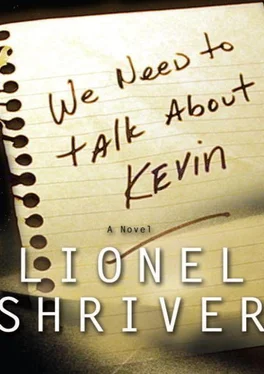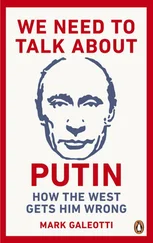Yet too vividly I can see this last week through the lens of my private if-only. I would have voted for Gore, you for Bush. We’d have had heated enough exchanges before the election, but this—this—oh, it would have been marvelous. Loud, strident fist pounding and door slamming, me reciting choice snippets from the New York Times , you furiously underscoring op-eds in the Wall Street Journal —suppressing smiles the whole time. How I miss getting exercised over bagatelle.
It may have been disingenuous of me to imply at the start of my last letter that when we conferred at the end of a day, I told all. To the contrary, one of the things that impels me to write is that my mind is huge with all the little stories I never told you.
Don’t imagine that I’ve enjoyed my secrets. They’ve trapped me, crowded me in, and long ago I’d have liked nothing more than to pour out my heart. But Franklin, you didn’t want to hear. I’m sure you still don’t. And maybe I should have tried harder at the time to force you to listen, but early on we got on opposite sides of something. For many couples who quarrel, just what they are on opposite sides of may be unformed, a line of some sort, an abstraction that divides them—a history or floating grudge, an insensible power struggle with a life of its own: gossamer. Perhaps in times of reconciliation for such couples the unreality of that line assists its dissolve. Look , I can jealously see them noting, there is nothing in the room; we can reach across the sheer air between us . But in our case, what separated us was all too tangible, and if it wasn’t in the room it could walk in of its own accord.
Our son. Who is not a smattering of small tales but one long one. And though the natural impulse of yarn spinners is to begin at the beginning, I will resist it. I have to go further back. So many stories are determined before they start.
What possessed us? We were so happy! Why, then, did we take the stake of all we had and place it all on this outrageous gamble of having a child? Of course you consider the very putting of that question profane. Although the infertile are entitled to sour grapes, it’s against the rules, isn’t it, to actually have a baby and spend any time at all on that banished parallel life in which you didn’t. But a Pandoran perversity draws me to prize open what is forbidden. I have an imagination, and I like to dare myself. I knew this about myself in advance, too: that I was just the sort of woman who had the capacity, however ghastly, to rue even so unretractable a matter as another person. But then, Kevin didn’t regard other people’s existence as unretractable—did he?
I’m sorry, but you can’t expect me to avoid it. I may not know what to call it, that Thursday . The atrocity sounds torn from a newspaper, the incident is minimizing to the point of obscenity, and the day our own son committed mass murder is too long, isn’t it? For every mention? But I am going to mention it. I wake up with what he did every morning and I go to bed with it every night. It is my shabby substitute for a husband.
So I have racked my brain, trying to reconstruct those few months in 1982 when we were officially “deciding.” We were still living in my cavernous loft in Tribeca, where we were surrounded by arch homosexuals, unattached artists you deplored as “self-indulgent,” and unencumbered professional couples who dined out at Tex-Mex nightly and flopped about at the Limelight until 3 A.M. Children in that neighborhood were pretty much on a par with the spotted owl and other endangered species, so it’s little wonder that our deliberations were stilted and abstract. We even set ourselves a deadline, for pity’s sake—my thirty-seventh birthday that August—since we didn’t want a child who could still be living at home in our sixties.
Our sixties! In those days, an age as bafflingly theoretical as a baby. Yet I expect to embark to that foreign land five years from now with no more ceremony than boarding a city bus. It was in 1999 that I made a temporal leap, although I didn’t notice the aging so much in the mirror as through the aegis of other people. When I renewed my driver’s license this last January, for example, the functionary at the desk didn’t act surprised I was all of fifty-four, and you remember I was once rather spoiled on this front, accustomed to regular coos over how I looked at least ten years younger. The coos came to a complete halt overnight. Indeed, I had one embarrassing encounter, soon after Thursday , in which a Manhattan subway attendant called my attention to the fact that over-sixty-fives qualified for a senior discount.
We’d agreed that whether we became parents would be “the single most important decision we would ever make together.” Yet the very momentousness of the decision guaranteed that it never seemed real, and so remained on the level of whimsy. Every time one of us raised the question of parenthood, I felt like a seven-year-old contemplating a Thumbellina that wets itself for Christmas.
I do recall a sequence of conversations during that period that lurched with a seemingly arbitrary rhythm between tending toward and tending against. The most upbeat of these has surely to be after a Sunday lunch with Brian and Louise on Riverside Drive. They no longer did dinner, which always resulted in parental apartheid: one spouse playing grown-up with calamatas and cabernet, the other corralling, bathing, and bedding those two rambunctious little girls. Me, I always prefer socializing at night—it is implicitly more wanton—although wantonness was no longer a quality I would have associated with that warm, settled Home Box Office scriptwriter who made his own pasta and watered spindly parsley plants on his window ledge.
I marveled in the elevator down, “And he used to be such a cokehead.”
“You sound wistful,” you noted.
“Oh, I’m sure he’s happier now.”
I wasn’t sure. In those days I still held wholesomeness to be suspect. In fact, we had had a very “nice” time, which left me bafflingly bereft. I had admired the solid oak dining set seized for a song from an upstate tag sale, while you submitted to a complete inventory of the younger girl’s Cabbage Patch Kids with a patience that left me agog. We commended the inventive salad with ingenuous fervor, for in the early 1980s goat cheese and sun-dried tomatoes were not yet passé.
Years before we’d agreed that you and Brian wouldn’t get into it over Ronald Reagan—to you, a good-humored icon with easy flash and fiscal ingenuity who had restored pride to the nation; to Brian, a figure of menacing idiocy who would bankrupt the country with tax cuts for rich people. So we stayed on safe topics, as “Ebony and Ivory” crooned in the background at a grown-up volume and I suppressed my annoyance that the little girls kept singing tunelessly along and replaying the same track. You bewailed the fact that the Knicks hadn’t made the playoffs, and Brian did an impressive imitation of a man who was interested in sports. We were all disappointed that All in the Family would soon wrap up its last season, but agreed that the show was about played out. About the only conflict that arose all afternoon was over the equally terminal fate of M*A*S*H. Well aware that Brian worshiped him, you savaged Alan Alda as a “sanctimonious pill.”
Yet the difference was dismayingly good-natured. Brian had a blind spot about Israel, and I was tempted to plant one quiet reference to “Judeo-Nazis” and detonate this affable occasion. Instead I asked him about the subject of his new script, but never got a proper answer because the older girl got chewing gum in her Barbie-blond hair. There was a long maunder about solvents, which Brian put an end to by lopping off the lock with a carving knife, and Louise got a little upset. But that was the single set-piece commotion, and otherwise no one drank too much or took offense; their home was nice, the food was nice, the girls were nice—nice, nice, nice .
Читать дальше












